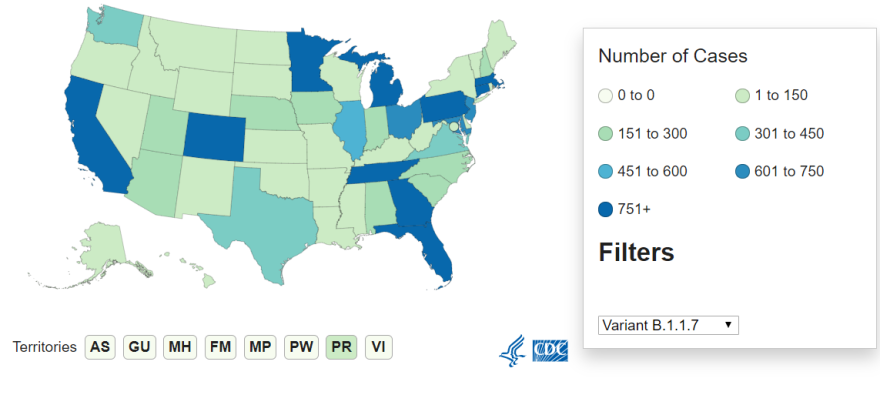While the skyrocketing numbers of vaccinations and loosening restrictions have dominated the COVID landscape, variants of the virus have quietly crept into New Hampshire.
Three of the four most concerning strains of COVID in the United States, aptly called “variants of concern” by the CDC, have been identified in New Hampshire by the Department of Health and Human Services in recent weeks.
Ten cases of the “California variant,” known for being about 20% more contagious and resistant to certain COVID treatments, have been found since it was first identified about a month ago. Just within just the last two weeks, the state identified another variant — the P.1 variant — which now has been found in 15 different samples.
Sign up for NHPR's coronavirus newsletter for more COVID-19 news in New Hampshire.
The B.1.1.7 variant, which was first identified in the state in mid-February, now comprises more than a fifth of COVID cases in New Hampshire, according to CDC data. The strain, more commonly known as the U.K. variant, will soon become the most common strain in the state as it has in the country as a whole, state health officials said.
The U.K variant is not only 50% more transmissible than other versions of the virus, but about 60% more lethal, studies have shown. Public health experts think this variant is responsible for surges in some of the country’s largest COVID hotspots right now, like Michigan.
Fortunately, early research seems to indicate that the current COVID-19 vaccines are effective in preventing infection from the B.1.1.7 strain. However, some experts fear the P.1 variant may be developing mutations that make some vaccines less effective.
The best way to make sure these variants don’t cause vaccination issues is to prevent the spread altogether.
“Rigorous and increased compliance with public health mitigation strategies, such as vaccination, physical distancing, use of masks, hand hygiene, and isolation and quarantine, is essential,” the CDC’s website reads.
Even so, Gov. Chris Sununu allowed the statewide mask mandate to lapse on Friday and announced that “virtually all” of the COVID restrictions will be lifted by May 7.
Jake Leon, a spokesperson for the N.H. Department of Health, said the variants of concern are still in the minority — out of the approximately 3,000 specimens sequenced, 284 have been identified as one of these variants, less than 10% of all specimens that have undergone genetic testing.
However, this minority might not exist for much longer.
“As we do more testing, we’ll find more variants, and the proportion of tests positive for variants of concern is likely to increase further because these variants of concern are more infectious and easily spread,” he said.
Leon said the state is tracking these variants in a variety of ways. Every other week, samples from N.H. residents are sent to the CDC for genetic testing. The state also asks that providers send specimens to the Public Health lab for genetic testing in cases in which individuals have recently traveled outside of New England, had COVID-19 within the last 90 days, or have gotten both doses of the vaccine.
This story was first published in the Concord Monitor. These articles are being shared by partners in The Granite State News Collaborative. For more information visit collaborativenh.org.







